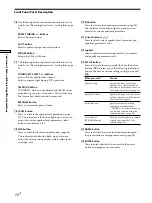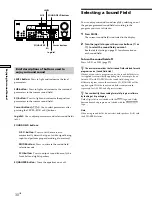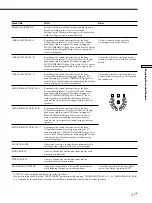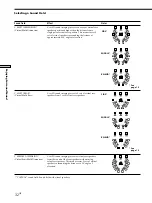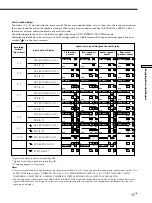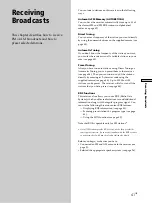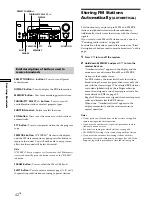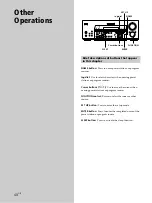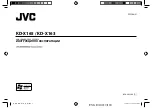
41
GB
Receiving Br
oadcasts
Receiving
Broadcasts
This chapter describes how to receive
FM or AM broadcasts and how to
preset selected stations.
You can tune in stations on this receiver in the following
ways:
Automatic FM Memory (AUTOBETICAL)
You can have the receiver automatically store up to 30 of
the clearest FM and FM RDS stations in alphabetical
order. (see page 42).
Direct Tuning
You can enter a frequency of the station you want directly
by using the numeric buttons on the supplied remote (see
page 43).
Automatic Tuning
If you don’t know the frequency of the station you want,
you can let the receiver scan all available stations in your
area (see page 43).
Preset Tuning
After you have tuned in stations using Direct Tuning or
Automatic Tuning, you can preset them to the receiver
(see page 44). Then you can tune in any of the stations
directly by entering its 2-character code using the
supplied remote (see page 44). Up to 30 FM or AM
stations can be preset. The receiver will also scan all the
stations that you have preset (see page 44).
RDS functions
This receiver also allows you to use RDS (Radio Data
System), which enables radio stations to send additional
information along with the regular program signal. You
can use the following three convenient RDS features:
— Displaying RDS information (see page 45)
— Scanning preset stations by program type (see page
45)
— Using the EON function (see page 45)
Note that RDS is operable only for FM stations.
*
*
Not all FM stations provide RDS service, nor do they provide the
same types of services. If you are not familiar with the RDS services
in your area, check with your local radio stations for details.
Before you begin, make sure you have:
• Connected an FM and AM antenna to the receiver (see
page 5).
• Selected the appropriate speaker system (see page 26).


